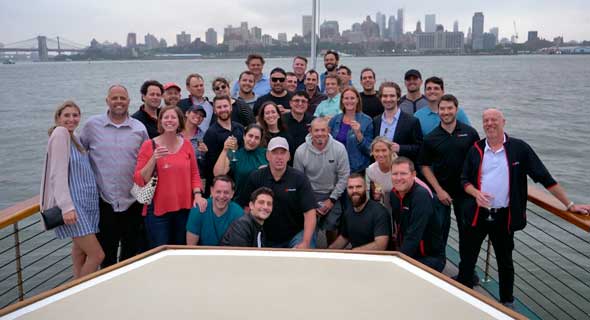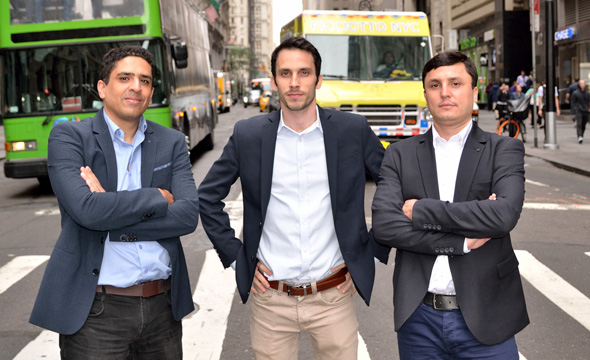Siemplify: “The U.S. market is the holy grail for Israeli tech startups”
In collaboration with Israeli Mapped in NY, Siemplify has joined CTech to share insights behind their reason to set up a base in the U.S.
“The U.S. market is the holy grail for Israeli tech startups,” explained Amos Stern, Co-founder and CEO of cybersecurity firm Siemplify. “The New York market, in particular, is huge and mature and is bright with customer and partner opportunities around every corner, including a tightly-knit, and fast-growing ecosystem in the blazing-hot sector of cybersecurity.”
Siemplify was founded in 2015 and the company established a base in New York in the same year. It did this, Stern confirmed, to be closer to a bigger market and eventually reach more customers.

More Israeli companies are moving to the U.S each year, but what makes New York such a special place to do business?
Company name: Siemplify
Field of activity/product: Cybersecurity/Siemplify Security Operations Platform
Founders: Amos Stern, Garry Fatakhov, and Alon Cohen
Year of founding/start of New York operations: 2015
Number of employees and whether the company is active in other locations: 170+, offices in New York and Tel Aviv and employees around the world
Sum of total funding to date/funding rounds completed: $58 million/Series C (last funding round)
Names of investors/VC backers: Georgian, Jump Capital, 83North, and G20 Ventures
General background on the founders/senior managers:
I met Alon Cohen and Garry Fatakhov while working at Elbit Systems, an Israel-based international defense contractor, where we trained security operations teams from around the world. While at Elbit, we imagined a better, simpler, more effective way to manage security operations. Hence, Siemplify was born. Our deep background in security operations center (SOC) management, security analysis, and data science, paired with first-hand knowledge of the daily challenges security operations teams face, led to the creation of our flagship product: the Siemplify Security Operations Platform, the industry’s leading independent SOAR platform.
Background on the product/service/platform/solution:
The Siemplify Security Operations Platform is designed to be "the operating system" of the SOC. It helps analysts become more efficient, engineers more effective and managers more informed about the SOC. Unlike other SOAR platforms which focus mostly on playbook building and automation, Siemplify was truly designed to manage the entire security operations function from end to end (think Workday for HR or Salesforce for sales).
In addition to being end to end and powerfully simple and intuitive to use for the SOC, the "secret (technical) sauce" of the product is its patented cyber ontology engine, which enables users to automatically group related security alerts into threat-centric cases and reduce analyst caseload by up to 80%.
The average enterprise takes in thousands of security alerts per day, created by a growing variety of disparate security systems, exposing security teams to mental fatigue due to the high volume and velocity of the alerts. Siemplify’s dynamic modeling approach to fielding alerts results in a significant reduction in the number of cases that a SOC team must process, as well as add important context that might otherwise be missed. Analysts can now prioritize potentially overlooked threats, allowing them to investigate, as one, alerts that might have been received from separate security sensors but are part of the same threat.
Why New York? What advantages does it offer? How does the market differ from Israel? How does the competition differ?
The U.S. market is the holy grail for Israeli tech startups. The New York market, in particular, is huge and mature and is bright with customer and partner opportunities around every corner, including a tightly-knit, and fast-growing ecosystem in the blazing-hot sector of cybersecurity. Countless direct flights to and from Tel Aviv, with only a small time difference, also makes New York an attractive location for Israeli startups, especially compared to Silicon Valley.
But with the good comes the… challenging. The United States is arguably the most competitive market in the world and cybersecurity is one of its fastest-growing industries. Just last year, some $11.5 billion of venture capital funding flowed into the space to help support hundreds of startups. That means you’re always on. You need to always be working to solve your customer challenges, constantly innovating and providing impeccable service. Fortunately, we are in an industry where rising to the occasion is easy. We are doing something that fundamentally is good, helping to protect organizations against highly professional cybercriminal groups, so that is an extra incentive to kick butt.
Two things you learned about the U.S. market from operating in New York:
1) Nothing compares to the grit and grind of New York. It’s contagious and makes you want to win. Covid-19 admittedly put a damper on the city’s quintessential hustle, but it’s coming back with a vengeance. It inspires you to want to crush daily, even when you’re feeling overwhelmed or beaten down.
2) You’re always in the nexus. New York is easy to get to via multiple airports. The social scene is conducive to incredible networking. There are so many skilled entrepreneurs ready and willing to share advice. Everything seems to be no further than a few subway stops away. And the city is where many of the world’s largest businesses, (aka future customers), call home.
Two things you learned about American investors as a result of starting operations there:
1) East Coast investors tend to gravitate toward East Coast companies, and vice versa happens on the West Coast. This is why spending time outside of New York is beneficial. More on that later!
2) Earlier, I mentioned the vibrant networking scene in New York. Take advantage of this as a way to make inroads to potential investors. But before you reach out, do your homework. Investors are especially impressed by entrepreneurs who lay out a strong case for why they would be a good fit in a VC’s portfolio.
Two suggestions for Israeli entrepreneurs on what to do in New York:
1) Visit Times Square once. And then never again. (Just kidding… sort of.) In seriousness, while New York can be enchanting, it can also be overstimulating. When it becomes too much, try to get away from the bustle, even if that means taking a stroll along the rivers or in one of the city’s many beautiful parks.
2) Speaking of getting away from the sensory overload of New York, an especially useful destination is Silicon Valley. Make it a point to spend time regularly (maybe one week every quarter) in the Bay Area, even if you’re not actively raising funds. Swap a coffee for a beer (SF is much chiller!) and get to know investors and potential partners.

On a scale of 1-10 how much did the Covid pandemic impact your work?
I would say 8.
It’s easy to become a workaholic when you’re at the helm of a booming startup. But if Covid-19 taught us anything, the moon will always be there. Some things are more important than work. At Siemplify, the pandemic certainly forced us to be more introspective about the personal struggles people go through, not just in the face of a deadly virus, but from all aspects of life. Zoom fatigue is real. Burnout is real. Mental health is paramount.
If you ensure you instill the right culture, then working remotely or somewhat remotely can still have a good productivity outcome. But we’ve learned that a tether is absolutely necessary, which is why we are back to hosting semi-regular physical meetups whenever (and as safely as) possible.
On a professional level, what was breakthrough tech even before Covid-19 struck, our product acted as a giant leap forward in the pandemic era. With cybersecurity analysts now unable to tap the shoulder of the colleague sitting next to them – which is what made the traditional, in-person SOC so desirable and conducive – our platform provides a single workbench with built-in capabilities to enable teams to seamlessly collaborate anywhere in the world.
What are the differences when it comes to recruiting employees?
Keeping with the tenor of the city, prospective employees in New York are energetic and driven and come with a sense of purpose. The talent pool is vast and diverse. Of course, this leads to robust competition for the best and brightest. Which forces, especially startups, to separate themselves from the pack.
What motivates people to make a job move? The obvious still applies — money, benefits, and opportunities for advancement — but nowadays it’s more than that. People need to know they are joining a company with a higher purpose, one that they can stand behind. Also mandatory is a strong culture, one that feels like family, where employees feel belonging to the greater group, where they can be passionate about their work, and have a supportive team who collaborates and cares for each other. Oh, and work-life balance matters a lot too, especially after enduring the rigors of Covid-19.
What are some of the workplace culture differences between Israel and New York?
One of the differences that immediately stuck at me was New York must have been where the expression “dress for the job you want, not the job you have” was born. While dress codes and expectations have relaxed over the years in New York City offices, employees here are no strangers to being fashion-forward, whereas in Tel Aviv it was not uncommon to see commuters casually dressed in shorts and flip-flops.
The other major difference is conversation. Israelis are blunt and direct, and generally, no topic is off-limits. In the United States, there is more sensitivity to words being used and how ideas are exchanged. At a time where empathy is valued more than ever, we all must remember to walk a fine line between straightforwardness and the potential for misunderstanding.
The IL Tech in NY project is a collaboration between CTech and Israeli Mapped in NY. For more information email Guy Franklin via this link.



